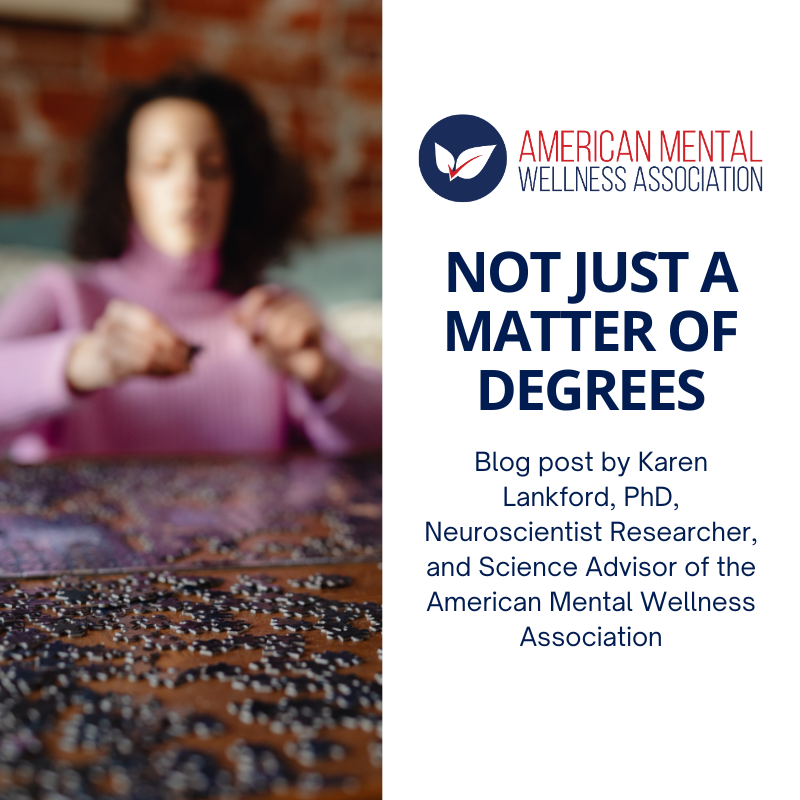Not Just a Matter of Degrees | Karen Lankford, PhD, Neuroscientist at Yale University
It has often been noted that the characteristic behaviors which we think of as making us human – language, tool use, and reason – are all also observed in other animals, albeit to a lesser degree. Some have tried to argue therefore that humans only differ from other animals in degree, not kind. However, this thinking misses one glaringly obvious difference between the roles these activities play in the lives of humans and other animals.
For other animals, language, tool use, and reason are purely utilitarian. They serve very limited functions and are employed to accomplish immediate goals. For humans, they permeate every aspect of our lives and take over functions that in other animals are controlled by instinct or learned social behaviors. It is not just a matter of different degrees of sophistication in tools or language.
It is not simply that an otter uses a rock to break open a shellfish, while a particle physicist designs a collider to break open an atom. It is also that humans often decorate tools and turn them into art objects and status symbols or make things just for the fun of making them. The same is true with language.
Other animals use their language skills solely for communicating immediately relevant information to others. Humans use language for social bonding, self-expression, competition, status displays, and fun. We make jokes and puns, produce crossword puzzles, and write erotic poetry. Language is so important to humans that giving someone “the silent treatment” is considered a punishment.
Humans do not just use their reasoning abilities to solve immediate problems. Humans try to decipher dead languages and calculate the age of the universe. We invent games and puzzles which exist solely for the purpose of having other people solve them. None of these actions serve any obvious survival value, but humans feel compelled to do them. Humans therefore experience language, tool uses, and reason in a manner that is qualitatively different from other animals. This is a difference in kind, not just a matter of degrees.
In a similar vein, many people tend to think that conditions such as clinical depression, anxiety disorders, and PTSD simply describe someone who is somewhat more depressed, anxious, or stressed than what they themselves experience in difficult times. They assume that the kinds of techniques which they use to cheer themselves up, calm themselves down, or distract themselves from problems should be sufficient to manage the problem.
The experiences of clinical depression, anxiety attacks, or PTSD however, are qualitatively different from mere sadness, worry, “feeling stressed out”. The effects of these neuropsychiatric conditions permeate every aspect of the person’s life. They force the sufferers to devote an extraordinary amount of energy just to carry out the ordinary tasks of daily living.
Clinical depression often feels like such a crushing weight on the person’s chest that is difficult to for them to even get out of bed. Anxiety attacks often send people to the ER for evaluation of a possible heart attack. PTSD can make people afraid to leave their own home for fear that they will have a sudden break down in the middle of the street. These are not things that people can just snap out of or push though.
The kinds of activities which would cheer up someone who was simply feeling a bit depressed, such as taking a walk or eating some ice cream, might have some tiny benefit for a person experiencing clinical depression, but they would be the equivalent of throwing a glass of water on a wildfire. The kinds of well-meaning advice that is so often given by friends and family to someone suffering from one of these conditions does not even come close to addressing the problem.
We need to treat serious health problems seriously, whether they happen to be in the brain, or some other part of the body. We need to be as serious about early treatment and prevention for mental illnesses as we are about heart disease or breast cancer, because each can be fatal if left untreated. It should not take a drug overdose, suicide attempt, or arrest to get someone into treatment.
We need to stop belittling people who have the good sense to recognize that something is wrong and do something about it before they become a statistic. Early treatment produces better outcomes. This is true for heart disease, and cancer, and mental health disorders.

